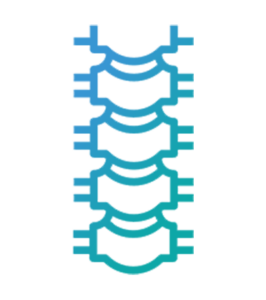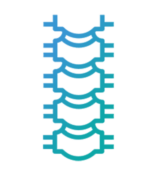
procedures to reach more patients

Spine Surgery
Spinal fusion
Laminectomy
Microdiscectomy
Kyphoplasty
Spinal cord stimulator
Spinal cord tumor removal
Scoliosis correction
Total disc replacement

Neurosurgery
Craniotomy for tumor removal
Craniotomy for cerebrovascular conditions
Microvascular decompression
Chiari malformation
Peripheral nerve procedures
Interventional radiology
Spine surgery

Orthopedic Surgery
Acetabular procedures
Total hip arthroplasty
Total shoulder arthroplasty
Latarjet procedure
Spine surgery

Head and Neck Surgery
Thyroidectomy
Parotidectomy
Parathyroidectomy
Mastoidectomy
Tympanoplasty
Radical neck dissection

Vascular Surgery
Carotid endarterectomy
Coronary Artery Bypass Graft
Aortic valve repair
Aortic valve replacement
Interventional radiology

Pain
Kyphoplasty
Vertebroplasty
Spinal cord stimulator
Facet joint denervation

Podiatric Surgery
Tarsal tunnel decompression
Lower limb nerve decompression

Prostate Surgery
Sexual dysfunction and urinary incontinence are both common side effects following prostate cancer surgery. Inadvertent nerve injury occurring during the surgery is believed to be one of the primary causes. Using nerve monitoring, Surgimon brings instant and accurate information regarding nerve location and function.
For you, this means that surgeons using nerve monitoring have additional information during the operation that may help them reduce inadvertent damage to these critical nerves and in doing so, potentially reduce the sexual dysfunction and urinary incontinence that are common side effects.
While current nerve-sparing techniques for robotic prostate surgery focus on preservation of parasympathetic nerves, it is well documented that somatic nerves also play a direct role in erectile function and continence control. Identifying critical, non-visible somatic nerves at risk during Robotic Prostate Surgery allows the surgeon to make informed decisions on how to spare these nerves during surgery. Nerve monitoring for Robotic Prostate Surgery is recorded with delicate electrodes that are sterilely placed in the appropriate muscle by the surgeon. This specialized nerve monitoring allows the surgeon to identify the location of, and assess the integrity of, somatic nerves critical to sexual function and urinary control prior to prostate removal. Monitoring also allows the surgeon to verify the location of somatic nerves during dissection, and validate the integrity of somatic nerves post-dissection.










